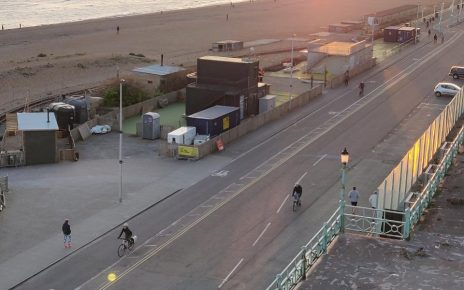Schiphol Airport, located just outside of Amsterdam, is preparing to test a new system that automatically slows the fastest electric bikes as they approach. The bikes, known as speed pedelecs, or s-pedelecs, are capable of going 45 km/h (28 mph) and would be slowed to the speed of regular bicycles as a matter of safety, reports Het Parool. The assurance of slower speeds could eventually allow s-pedelecs fitted with Intelligent Speed Assistants (ISAs) to join other bicyclists on the dedicated bike lanes found everywhere in the Netherlands.
Schiphol is trying to increase the number of its employees who cycle to work, with a focus on employees who live within 25 km (15.5 miles) from the airport. The adoption of s-pedelecs would certainly help make those longer commutes manageable while also reducing road congestion around the busy airport. Currently, riders of s-pedelecs must wear helmets and are forbidden to use bike paths because of the unsafe speed disparity they create. S-pedelecs are also expensive, but a new government-backed scheme introduced in January allows employees to lease one for less than the cost of a Netflix subscription. A €3,000 (about $3,260) e-bike, for example, could be leased through an employer for about €7 ($7.60) per month.
To help manage the influx of the speedy e-bikes, the bicycle lanes around Schiphol were recently mapped and photographed to include traffic signs. The maps, combined with GPS and speed limiters on the s-pedelecs’ electric drives, can automatically slow down the fast electric bikes. Consideration is also being given to controlling traffic signals such that riders hit only green lights along the route. Another use would be to alert riders of congestion by vibrating the handlebars, reports Het Parool.

At the moment, just 4,000 out of Schiphol’s 66,000 airport employees cycle to work. That’s low compared to Amsterdam, where roughly half of all commutes occur by bicycle. In September, Schiphol announced a plan to increase the number of commuters to 7,000 by the end of this year and 10,000 by the end of 2024. Schiphol and the Dutch Ministry of Infrastructure and Water Management are investing in cycling “superhighways” between the cities of Hoofddorp, Amsterdam, and Schiphol to make its goals a reality.
While new to e-bikes, ISAs are deployed as options by a number of car brands. The options are listed with names like “Speed Limit Pilot” for the E-Class Mercedes, Volvo’s “Automatic Speed Limiter,” or Ford’s “Intelligent Speed Limiter.”
An ISA like the one being tested on e-bikes at Schiphol could allow s-pedelec riders to rejoin the safety of bike lanes in city centers. They could ride as fast as they like on the outskirts of town before being slowed to rejoin the flow of cycling traffic in congested, multimodal cities like Amsterdam. Standard e-bikes capped at 25 km/h (15.5 mph) don’t require a helmet and can be ridden on bike paths.
There’s still a lot we don’t know about the Schiphol system, which Het Parool says will begin testing soon. But first, the airport has to prove it can slow down the bikes. Later, it’ll have to ensure that all s-pedelecs have ISAs installed, something the European Transport Safety Council would likely support.
